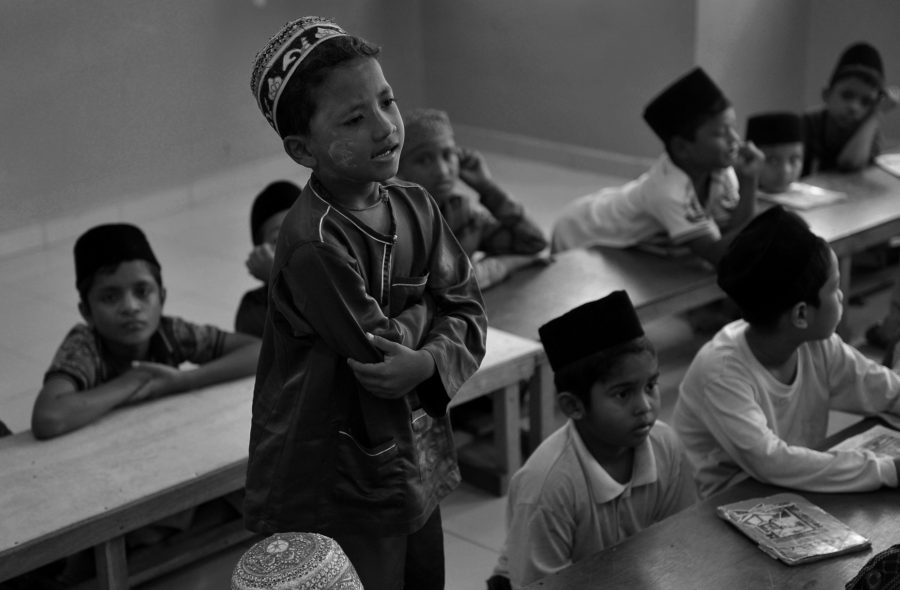By Arooj Sultan (BA Economic and Politics)
Last Friday, in a report released by the United Nations Children’s Fund, it was stated that an estimated 340,000 Rohingya children are living in dismal, insalubrious conditions in Bangladeshi refugee camps, where they have little to no access to enough food, water, shelter and healthcare. The 600,000 Rohingya people that fled to Bangladesh after the brutal military crackdown in Myanmar now live in a state of limbo. Bangladesh doesn’t fully recognise them as refugees and wishes for the Rohingya people to be repatriated back to Myanmar as soon as possible, yet the Burmese government has historically refused citizenship to the Rohingyas because they believe them to be illegal Bangladeshi immigrants. Though the Rohingya have long been persecuted in Myanmar and subsequently forced to live as aliens on the fringes of their own country, the recent military crusade against them has driven them out of their homes and across borders, effectively making them stateless. Many of the Rohingya people had to no choice except to flee from the violence, into neighbouring countries where they are an unwelcome burden. Those that now live in refugee camps, are fearful that they may be expelled and forcefully resettled in the Rakhine State where the Burmese military might restart it’s campaign of terror and torture. And whilst grappling with those fears, the Rohingya now also have to contend with thundering storms, bearing down on Bangladesh, that are tearing apart their makeshift shelters in the refugee camps.
In October 2016, nine border policemen were killed in an attack claimed by the Arakan Rohingya Salvation Army —a militant pro-rohingya group, which is considered a terrorist organisation by the Burmese state. The Burmese military launched a full-scale security operation, in Rakhine state, against ARSA however what followed was sustained military action in Rohingya villages. During the crackdown government troops were accused of severe human rights abuses, involving rape, arson, torture and murder. Many activists and former residents have described the horrors perpetuated by the Burmese military, actions such as firing indiscriminately at unarmed villagers and burning alight entire villages. Those actions all signal to a planned campaign of ethnic cleansing against the Rohingya people. Though the Burmese government and military continue to deny any wrongdoing, citing wrongful western media coverage they imply that it was ARSA themselves that set fire to Rohingya villages in order to malign Myanmar. However, many international human rights agencies, including the UN, believe they posses enough evidence to state that a mass scale ethnic cleansing campaign is taking place in Myanmar.
The situation in Myanmar is eerily reminiscent of the Armenian Genocide, where approximately 1.5 million people were killed in a similar manner. Human history is rife with examples of ethnic cleansing and genocide, like that in Bosnia and Herzegovina or Rwanda, and events in Rakhine state are unfolding in much the same way, yet apart from hollow condemnations or some aid efforts the international community has failed to rally together to stop the atrocities being committed in Myanmar. Breaking off diplomatic relations with Myanmar or collectively placing sanctions upon Myanmar are just some of the ways that other nations can effectively exert pressure upon the Burmese state to end their persecution of the Rohingya but none of this is happening. The answer to the international community’s inaction lies in the geo-politics of the area. Although neighbouring states, Muslim countries and western nations have criticised out Myanmar for its despicable actions, no concrete action has been taken and that is because their political interests align with not isolating Myanmar. China is firm ally of the Burmese state and has defended the military crackdown, as necessary action needed to restore peace and stability in Rakhine state, where coincidentally China has planned an economic zone that will be part of its larger ‘One belt, One road’ economic scheme involving Myanmar and other neighbouring countries. Thus, China and many other countries in the region will not act decisively against Myanmar because it goes against their own economic interests to do so. The US probably wary of China’s hold in Myanmar also does not want to cut ties with Myanmar, as it would serve as push towards increasing loyalty towards China in that region. These economic and political reasons, among others, serve as a cause for many nations to only pay lip service to the plight of the Rohingya people.
The Rohingya, very aptly termed by a UN spokesperson as ‘the most friendless people in the world’, are currently bereft of home, country and identity as no country is willing to claim them as their own. And given the inaction of the international community it does not look as if this crisis is going to end anytime soon. Therefore, the least we can do is continue to talk about the issue and keep attention on it. It is that attention that has forced the Burmese government to plan to resettle the Rohingya and allow them back into the country. Thus, some small concessions can be won for the Rohingya people if this does not become another forgotten conflict of the world. However, it is clear that attention alone is not enough, since although the Rohingya have been offered a passage home they are still quite unwelcome — hundreds of hardline Buddhists are protesting their potential return, and those of the Rohingya who choose to return will probably find themselves worse off than they used to be as the Burmese state is only accepting those with id and documentation (something that the Rohingya have categorically been denied in the past), thus many will be unable to lay claim to their land and property. The return of the Rohingya people has become a catch-22 sort of situation. The Rohingya desperately need help and we can provide that, in some small way, by at least donating to relief organisations working on the ground such as the UNHCR etc.
